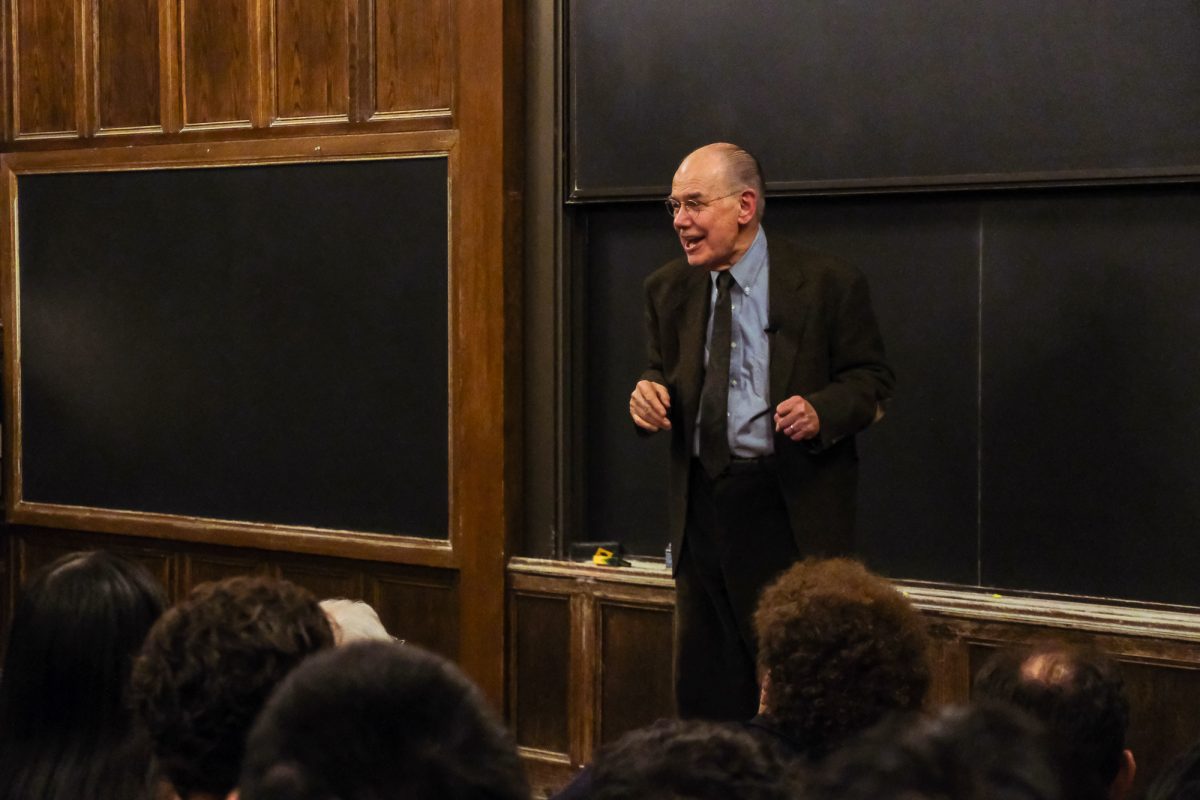Michael Kinsley thinks libertarians are just great! Almost completely wrong on policy, but just great nonetheless!Kinsley starts his Washington Post column by explaining the ideas behind libertarianism and concedes that libertarians are right sometimes. But not often:
So what is wrong with the libertarian case for extremely limited government? Economics 101 teaches some of the basic justifications for government interference in the economy. Some things, such as the cost of national defense, are “public goods.” We can’t each decide for ourselves how much defense we want. We have to decide that together. Then there are “externalities,” which are costs (or, sometimes, benefits) that your decisions impose on me. Pollution is the classic example. Without government involvement of some sort to override our individual judgments, we will produce more pollution than most of us want.
First of all, almost no libertarian thinks that the government shouldn’t provide a national defense–it’s one of the few things they (we) want government to do.As for externalities, other than pollution, what else you got? There certainly are other externalities (such as second hand smoke, or your neighbor’s WiFi), but pollution is one of the few that is used to justify major government intrusion. But libertarians don’t ignore externalities, we just think there are other ways to deal with them. A moderate libertarian would say that government too often ignores the trade-offs between regulating pollution and hurting businesses. An extreme libertarian would say that government should not regulate pollution at all.What would happen then?!? Would the world just fall apart?? Probably not. People who care about pollution would probably be less likely to patronize/invest in businesses that pollute (wouldn’t you Mr. Kinsley?). But how would they know which companies are “green” and which aren’t? Probably the same way we know what movies are appropriate for kids and which ones aren’t–we don’t need the government to tell us. If government got out of the business of monitoring pollution, private companies would get in it.Kinsley continues:
Libertarians have a fondness for complex arrangements to make markets work in situations where the textbooks say they can’t. Hey, let’s issue stamps, y’see, and use the revenues to form a corporation that sells stock to buy military equipment, then the government leases the equipment and the stockholders vote on whether to user it — and so on. The point becomes proving a point, not economic or government efficiency.
I don’t know how to respond to this–except to wonder how he knows that libertarians all say “y’see” a lot–so I won’t.A little later, Kinsley says:
Libertarian thinking has been useful, for example, in making it easier to get prescription drugs through the maze at the FDA. The Terry Shiavo case of 2005 was libertarianism’s greatest moment so far, as the entire nation rose up in defense of her right to die. The trouble here is that libertarians tend to analogize everything to a right to die. If you have the right to end your own life, you must have the right to do anything else you wish, short of that. If you’re allowed to shoot yourself through the head, why aren’t you allowed to drive without a seat belt?
God, I hope Terri Schiavo wasn’t libertarians’ greatest victory. (Who thinks Terri Schiavo and “libertarian victory?”) Also, libertarians don’t “analogize everything to a right to die.” Anyway, here’s why government should tell you to wear your seatbelt:
The answer is that it’s a bad analogy. When you drive without a seat belt, you are not motivated by a desire to die, or even a desire to take a small risk of dying. Why should your motive matter? Because your death — especially your death in a car crash — does impose externalities on others. I would pay good money not to have to see your bloody carcass lying beside the highway, or endure the traffic jam, or pay the emergency room costs. A serious right like the right to die may be worth the cost, while a right to be careless or irresponsible is not.
Well that’s great: Michael Kinsley doesn’t want to see your bloody carcass, so wear a seatbelt! Never mind that cops can now pull people (minority-people?) over practically willy-nilly (at least in Illinois) if they think maybe, possibly, there’s a chance you’re not wearing a seat belt. Never mind, that there could be reasons other than “carless[ness] and irresponsibil[ity]” for not wearing a seat belt. Forget these things, because if you die Michael Kinsley might have to look at your “bloody carcass.” And he doesn’t want to see it.Well I don’t want to see Terri Schiavo’s dehyrdrated face. Oh, and you know what, I don’t think people should swear–it’s just crass and makes me upset! Therefore it’s an externality! The “right” not to be offended–that’s basically, in a broader sense, what Kinsley means–is constantly used as a justification for curtailing freedom.Kinsley also cites “traffic jams”–which is stupid: Traffic jams are caused by the accident, not by someone not wearing a seatbelt at the time of the accident–and “emergency room costs” as reasons to mandate seat belt usage. It’s the latter reason that is most often used as rationale for such laws. But why would we have to pay emergency room costs anyway? Because liberals like Kinsley want the government to do so. And now that they have their way, they use it as justification for more government intrusion. They say that the more money you get, the more you want. Well it’s been proven time and again: The more control government gets, the more it wants. Under Kinsley’s logic why not ban drinking, smoking, and fatty foods–in the long run government might end up paying for its citizens’ indulgence.Kinsley concludes his column:
Extreme libertarians believe this is immoral or even unconstitutional, and even more moderate libertarians disapprove of government social welfare programs as an infringement on the freedom of taxpayers. But freedom is only one of the two core values our nation was built on. The other is equality. Defining equality, libertarians tend to take a narrow view, believing that it means only political equality with no financial aspects. Defining freedom, by contrast, they take a broad view, and see a violation in every nickel a citizen must spend. Libertarians ask: By what justification does the government concern itself with inequality — financial or otherwise — in the first place? They are nearly alone in asking this question. Even conservatives claim a great concern for equality of opportunity, while opposing opportunity of result. And the reasons seem obvious: some degree of material equality as a necessary basis for political equality; the huge role of luck in getting each of us to our relative stations in life; etc. But nothing like this is obvious to libertarians. They force us to think it all through from scratch. Good for them.
Our country was founded on equality of rights, not equality of results, opportunity, or financial equality. That’s the beauty of the libertarian view of freedom. A libertarian thinks that everyone should be able to do whatever they want. And might that be the closest we’ll ever get to true equality?







